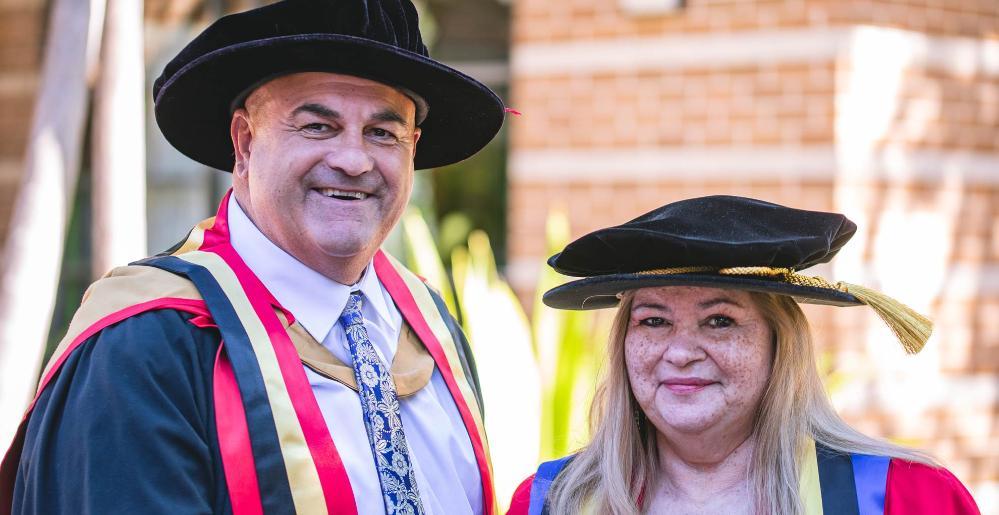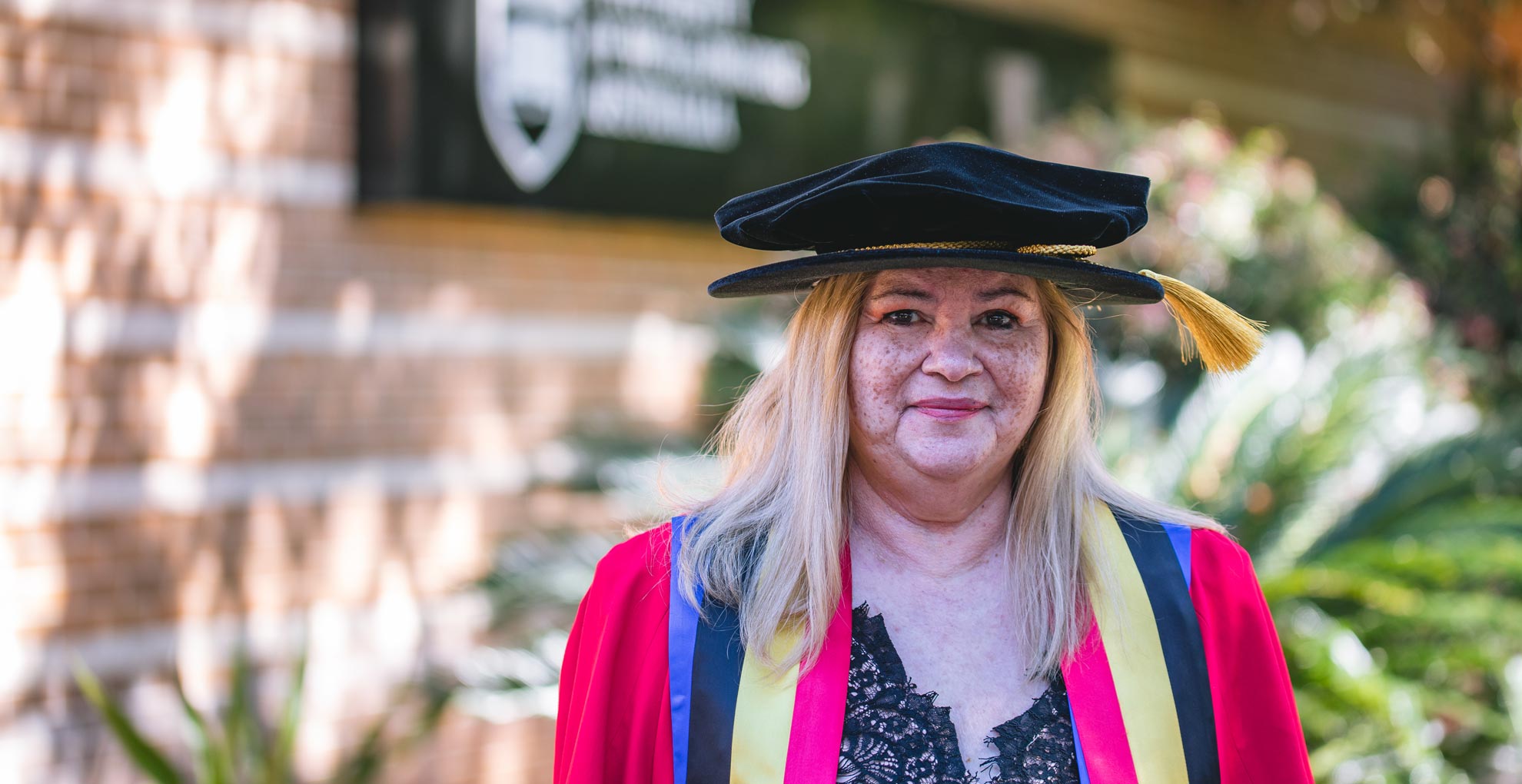November 6, 2019
Aunty Gail Wallace shares her journey, from Aboriginal Mission to law graduate
Community leader receives Honorary Doctorate for contribution to social justice
When Aunty Gail Wallace was a young girl, she believed that she was destined for a life of labour, for a life working in domestic situations or in the fields.
Growing up on an Aboriginal Mission on the South Coast, Aunty Gail spent her summers as a child following her parents along the coast as they undertook seasonal work. She was an inquisitive child, but a life spent on the Mission, exposed to the horrific racism that Aboriginal people experienced on a daily basis, gave her little reason to believe that she would amount to much.
“In the 1950s and 60s, we weren’t allowed to attend mainstream schools,” Aunty Gail said. “We had a school on the Mission, but the teacher wasn’t good. I entered a mainstream high school, but we were discriminated against because Aboriginal children were put into the special education classes.
“My parents didn’t appreciate the importance of us gaining an education as they thought there was no cause for it. Aboriginal people at that time never thought that we would amount to anything other than labour work.”
Everything changed for Aunty Gail when Gough Whitlam’s government came to power in 1972. University fees were abolished and, suddenly, Aboriginal people, and women, were encouraged to study. Australia’s 21st prime minster also established the Department of Aboriginal Affairs and introduced the Aboriginal Land Rights Act.
“In the 1970s, the Whitlam government changed everything. He did a lot for Aboriginal people and for women, too,” Aunty Gail said. “His policies encouraged Aboriginal people to gain an education and attend training in mainstream employment – so I took that opportunity."
She enrolled in a Certificate of Secretarial Studies at the then Illawarra Institute of Technology – now TAFE – in Nowra, and 13 years later, in 1991, she became the first Aboriginal woman to study a Bachelor of Laws at the University of ĚěĂŔ´«Ă˝.
Today (Wednesday 6 November), almost 30 years after she first came to UOW, Aunty Gail Wallace was bestowed an Honorary Doctorate from the University, in recognition of her decades of service to her community and for her advocacy on social justice.
Aunty Gail said she was thrilled, but in an insight into her humble nature, she said she could think of many others who deserved the Honorary Doctorate.
“I feeling extremely honoured to be recognised for my hard work,” she said. “I feel there are so many more people who are more deserving that me, but I am really appreciative of it and of the recognition.”
There are few people who have made a more positive contribution to their communities than Aunty Gail.
Her desire to study the law was motivated by her deep need to help Aboriginal people, who were falling victim to a justice system that was deeply unfair.
She worked for a number of federal departments in the 1980s – including the Department of Social Security, and the Education Department – which gave her an understanding of how policy was formed and how little agency Aboriginal people had in the decisions that would affect their lives.
“My people were being locked up for offensive language, for not paying fines, and things like that,” Aunty Gail said. “There wasn’t much training for magistrates and judges around some of the root causes of Aboriginal people offending, such as their trauma and disadvantaged situations.”
After graduating in 1996, Aunty Gail began using her law degree to attempt to break down the communication and cultural barriers between Aboriginal people and non-Aboriginal people in the justice system. It is difficult to distil these achievements into a few paragraphs.
She began work that year with the Attorney-General’s Department, as an executive officer of the Aboriginal Justice Advisory Council, before transferring over to the Office of the Director of Public Prosecutions in NSW. She was the only Aboriginal person employed in the Department and she realised quickly the need for greater representation.
“Supporting my people as victims and witnesses in court taught me about the communication barriers that prevented them from receiving any justice within the criminal justice system. I set out to educate prosecutors and Crown prosecutors about the communication barriers, which are linked to language but also to culture and historic experiences.”
In 2001, Aunty Gail embarked on a project that would garner state-wide and national recognition, the pilot project, Circle Sentencing, which saw the introduction of elders into the court sentencing process of Aboriginal offenders.
A few years later the project expanded and included a program for young offenders. Shortly after the trial period, models around the country began to emerge and operate as an alternative to sentencing procedures.
Working with the elders, the community, court officials, victims and offenders, Aunty Gail's role in Circle Sentencing brought decades of lived experience along with the ability to translate complex legislation and laws to provide the elders, offenders and victims with necessary information to make informed decisions. Aunty Gail was the essential conduit between the justice system and the community.
“This is the most revolutionary program for Aboriginal people I have ever heard of or come across. For the first time in non-Aboriginal history, our Aboriginal elders were given the authority within the criminal justice system or any system, to deal justly with their people who were offenders or victims,” Aunty Gail said.
“The elders I chose for the circle court panel were elders who the offender knew, looked up to, and respected. There had to be mutual respect in the circle if offenders were to listen to what the elders had to say and subsequently turn their lives around.”

Over the past decade, Aunty Gail has been a driving force behind Waminda, a women’s health and welfare corporation in Nowra, on the NSW South Coast. A culturally safe and holistic service, Waminda has been instrumental in providing support to Aboriginal women in the region.
Dr Marlene Longbottom, a Postdoctoral Research Fellow at UOW’s Ngarruwan Ngadju First Peoples Health and Wellbeing Research Centre, said Aunty Gail was the backbone of the Shoalhaven community.
“Aunty Gail has been a driving force in ensuring Aboriginal women are encouraged and supported to succeed in life. This can mean overcoming traumatic events to flourish and become the women they are destined to be,” said Dr Longbottom.
It has been a challenging and daunting journey at times, but Aunty Gail would not change a thing.
“It has been amazing. My heroes are my elders, who paved the way for me,” she said.
In order to gain an understanding of Aboriginal heritage and history, Aunty Gail recommends the book Dark Emu, by Bruce Pascoe, to the next generation of Aboriginal people.
“Dark Emu destroys the myths that we were simply nomadic hunters and gatherers,” she said. “It provides evidentiary proof that we cultivated, harvested, and stored crops and that we built dams and villages. All this was hidden so they could take possession of the land.”
Decades after she defied the parameters society had placed on her and Aboriginal people in general, Aunty Gail is full of pride at the young Aboriginal people she sees agitating for change and making an impact on the world. She encourages them to be “bi-culturally competent”, thriving in the modern world without losing their connection to their heritage.
“Read as much as you can about what’s going on in the world,” she encouraged. “Learn about your culture and your heritage. Be bi-culturally competent. Be knowledgeable and skilled up in both worlds. Know, live, and be proud of your cultural heritage and be educated and trained with skills that enable you to compete in broader society.
“Travel the world and learn about other Indigenous people’s plights. Get an education and value it like gold.”
